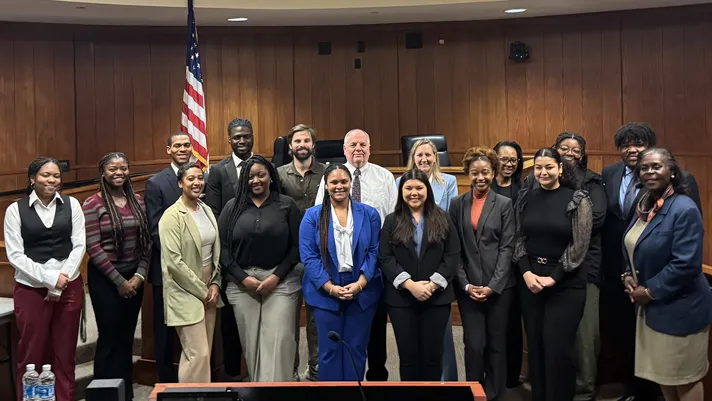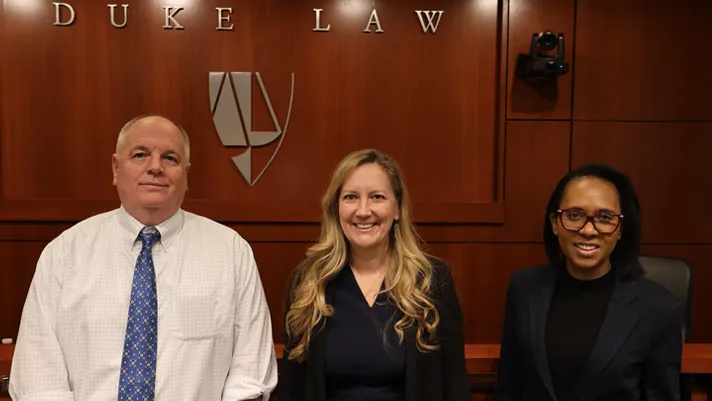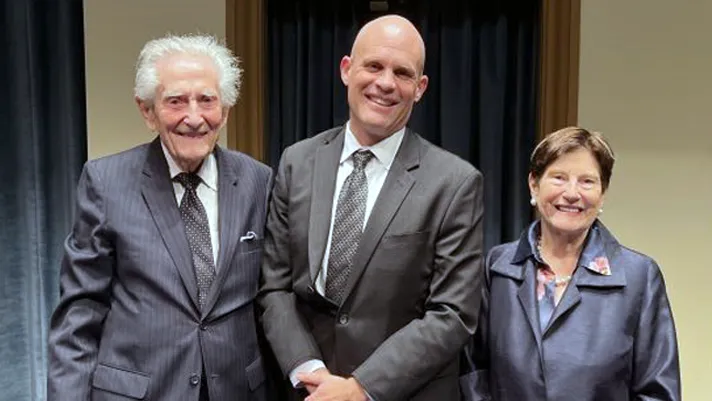
Law students are seen with Federal Circuit judges following a special sitting at North Carolina Central University School of Law.
Law students were asked to set aside their casebooks to witness “justice in action” as Federal Circuit judges and attorneys recently gathered for oral arguments at three North Carolina law schools.
“This program has universal benefits,” said Chief Judge Kimberly A. Moore, of the U.S. Court of Appeals for the Federal Circuit, who participated in a series of oral arguments in North Carolina. “It serves an important civic education function while at the same time reenforcing for judges the importance of the court’s mission not only to the litigants whom it serves but also to the next generation of aspiring lawyers.”
Over 100 eager law students from North Carolina Central University School of Law, the University of North Carolina School of Law, and Duke University School of Law gathered in campus auditoriums in February to watch as judges and attorneys deliberated cases involving patent and government contract disputes.

Judge Todd M. Hughes, Chief Judge Kimberly A. Moore, and Judge Tiffany P. Cunningham, of the Federal Circuit, visit Duke University School of Law for a special sitting. Credit: Duke University School of Law.
The Federal Circuit, located in Washington, D.C., has exclusive nationwide jurisdiction over a variety of subject areas, as well as a statutory requirement to provide citizens with reasonable opportunities to appear before the court. This creates a unique opportunity to hold oral arguments outside of D.C., including most recently in the San Francisco Bay Area and in Boston later this fall.
“The court believes that by engaging with the public through this program it can promote transparency and increase public trust and confidence in the Federal Circuit and the Judiciary,” Moore said.
Federal courts of appeals across the country regularly conduct special sittings at law schools to provide law students with real-life exposure to a sitting panel of judges, lawyers presenting oral arguments, and the briefing in real cases. A question-and-answer session often follows oral arguments as law students are able to gain valuable insights into career paths in the justice system.

Judge J. Clifford Wallace, Judge John B. Owens, and Judge M. Margaret McKeown, of the Ninth Circuit, visit the University of San Diego (USD) School of Law for a special sitting. Credit: Alexis Vercollone, USD School of Law.
"Sitting at law schools gives the students a chance to see the court up close and personal,” said Judge M. Margaret McKeown, of the U.S. Court of Appeals for the Ninth Circuit, who recently participated in oral arguments at University of San Diego School of Law. “We follow the arguments with a lively question and answer session and then a lunch with the students. What better way to spend our time than with the next generation of lawyers?”
“The energy that law students bring to argument — as advocates or merely spectators — is very special,” said Judge John B. Owens, of the Ninth Circuit, who also took part in the special sitting in San Diego. “I always look forward to law school sittings, and hope this important tradition continues.”
Learn more about the U.S. courts of appeals.
Subscribe to News Updates
Subscribe to be notified when the news section is updated.
